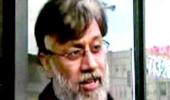The "serious" prison sentence for Pakistani-Canadian Tahawwur Rana should send a tough message to all individuals planning to indulge in any direct or indirect terrorist activities that they cannot escape detection and punishment, US prosecutors said on Friday.
52-year-old Rana, an accomplice of Mumbai attack terrorist David Headley, was on Thursday sentenced to 14 years in jail followed by five years of supervised release for providing material support to Pakistan-based LeT and for backing a "dastardly" plot to attack a Danish newspaper.
"This serious prison sentence should go a long way towards convincing would-be terrorists that they can't hide behind the scenes, lend support to the violent aims of terrorist organisations and escape detection and punishment," said Gary S Shapiro, Acting US Attorney for the Northern District of Illinois.
The US District Judge Harry D Leinenweber gave his order after hearing from both the government attorney and those of Rana, during which the two argued on the length of imprisonment.
The last minute arguments lasted for more than an hour and half before the judge noted "This certainly was a dastardly plot".
Cory B Nelson, Special Agent-in-Charge of the Chicago Office of the FBI, said, "It is my hope that the judge's decision on Friday sends a message to those who plot attacks and those who provide the support to make the plots possible, both here and abroad, that you will be held accountable for your actions."
"..Our mission, detecting and preventing terrorist acts and eliminating the enabling support provided by terrorist sympathisers, remains our top priority," he said.
Soon after the sentencing, Peter Blegan, Rana's attorney, said he was satisfied with the verdict. Given the fact that Rana has already served three years behind bars after his arrest in October 2009, Blegan said this would be included in his 14 years of sentencing.
He also hoped that the possible good behaviour shown by Rana inside the prison could result in further reduction of his jail term. Blegan exuded confidence that Rana could be set free after serving another 10 years in jail.
Rana, who was originally arrested in 2009 for his involvement in the 26/11 Mumbai attacks, was acquitted of that charge.
However, Indian investigators have accused him of being involved in the Mumbai attacks that killed 166 people and are seeking to question him for the second time.
Co-defendant David Headley, 52, pleaded guilty in March 2010, to 12 terrorism charges, including aiding and abetting the murders of six Americans in Mumbai.
Headley, who is scheduled to be sentenced next Thursday (January 24), has cooperated with the government since he was arrested in October 2009, and testified as a government witness at Rana's trial. He is facing a maximum of life in prison.
The evidence at Rana's trial showed that he knew he was assisting a terrorist organisation and knew their violent goals, and readily agreed to play an essential role in achieving their aims.
The government contended that Rana knew the goal of Lashkar was to retaliate against and influence the Indian and Danish governments and intended that the support he provided -- enabling Headley's activities -- would be used toward that purpose.
In a post-arrest statement in October 2009, Rana admitted knowing that Lashkar was a terrorist organisation and that Headley had attended training camps that Lashkar operated in Pakistan. Headley testified that he had attended the training camps on five separate occasions between 2002 and 2005.
In late 2005, Headley received instructions from members of Lashkar to travel to India to conduct surveillance, which he did five times leading up to the Mumbai attacks three years later that killed more than 160 people and wounded hundreds more.
Headley obtained approval from Rana, who owned First World Immigration Services in Chicago and elsewhere, to open a First World office in Mumbai as cover for his activities. Rana directed an individual associated with First World to prepare documents supporting Headley's cover story, and advised Headley how to obtain a visa for travel to India, according to Headley's testimony, as well as emails and other documents that corroborated his account.
Between November 26-28, 2008, 10 attackers trained by Lashkar carried out multiple assaults with firearms, grenades and improvised explosive devices against multiple targets in Mumbai, some of which Headley had scouted in advance.
Regarding the Denmark terror plot, Headley testified that in the fall of 2008, he met with a Lashkar member in Karachi, Pakistan, and was instructed to conduct surveillance of the 'Jyllands-Posten' newspaper offices in Copenhagen and Aarhus.
In late 2008 and early 2009, after reviewing with Rana how he had performed surveillance of the targets attacked in Mumbai, Headley testified that he told Rana of the planned attack in Denmark and his intended travel there to conduct surveillance of the newspaper's facilities.
Headley obtained Rana's approval and assistance to identify himself as a representative of First World and gain access to the newspaper's offices by falsely expressing interest in placing advertising for First World in the newspaper.






